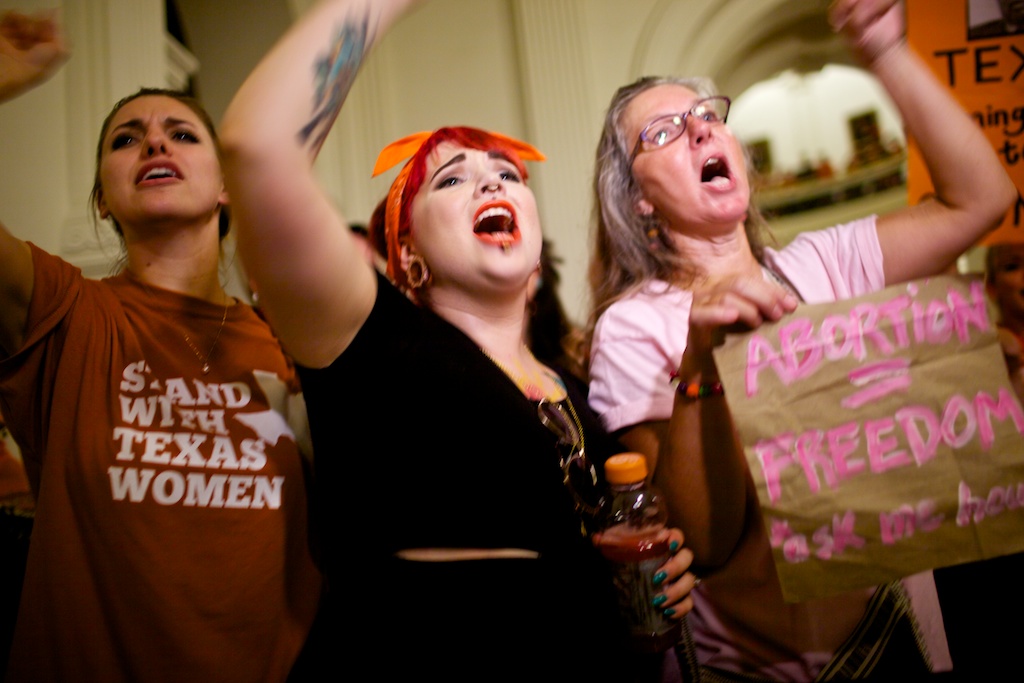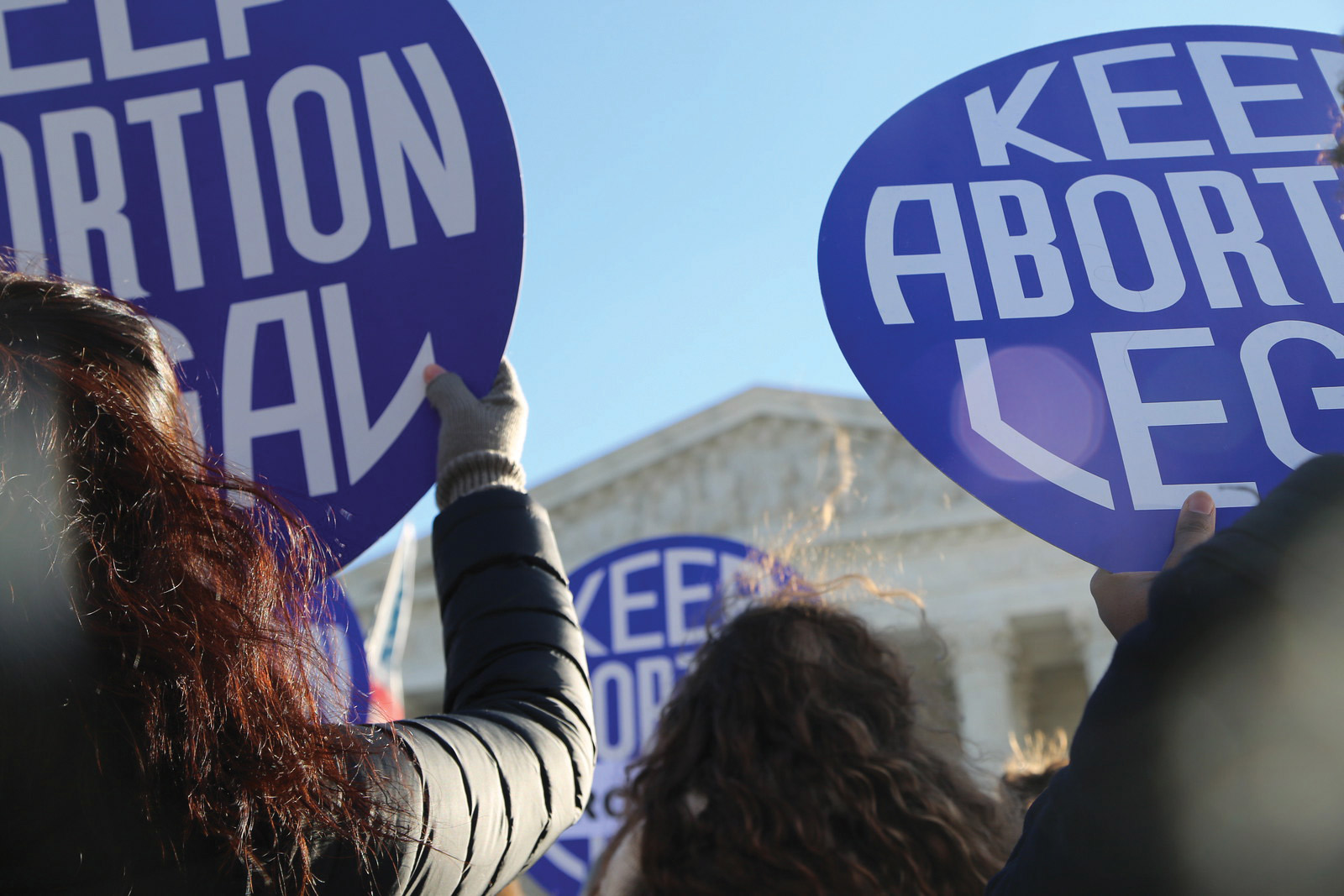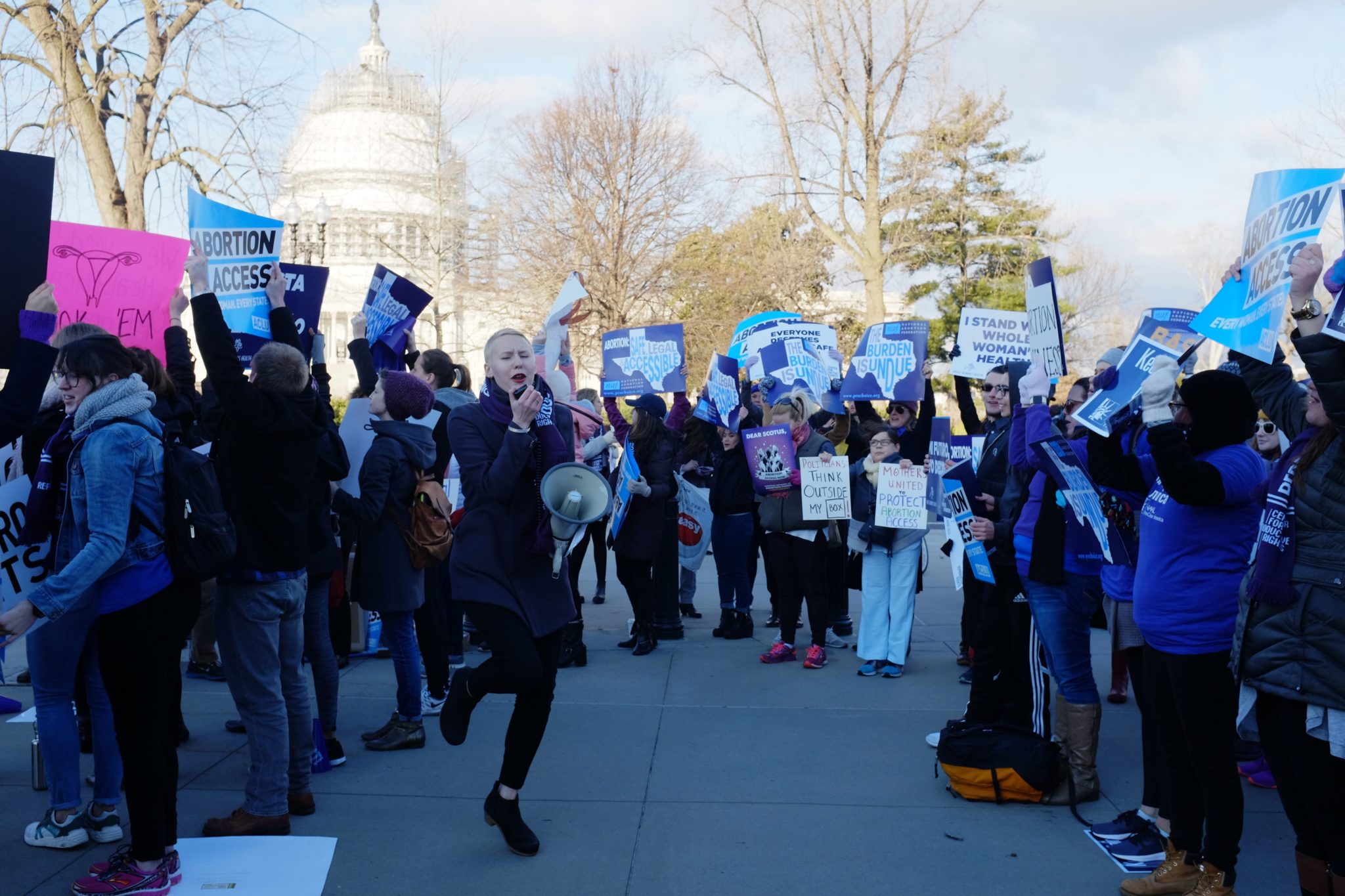
Supreme Court Strikes Down Texas Anti-Abortion Law
As it unfolded: the day the Supreme Court issued the most important ruling on reproductive rights in a generation, striking down Texas' abortion law.
7:00 p.m.
That’ll do it for us, folks! Thanks for tuning in.
6:55 p.m.
And here with our final dispatch is Alexa, writing about what Texans can expect in the coming weeks and months for access:
Today, five Supreme Court justices — led expertly by known data nerd Stephen Breyer — unequivocally affirmed that when state legislatures craft abortion restrictions in the name of patient health and safety (a legitimate interest granted to states by Roe v. Wade), lawmakers have to have solid proof that those regulations will actually protect patients.
We’ve known all along that Texas didn’t have evidence that the law’s restrictions protected patients. We heard it at committee hearings and legislative floor debates in 2013 when the law was first introduced, we heard it in Austin during the 2014 federal district court bench trial, and we heard it all the way through March during Supreme Court oral arguments. The Supreme Court ultimately agreed with what medical experts, researchers and providers have been saying all along: that HB 2-style regulations actually jeopardize patient health and place an “undue burden” on people seeking abortions.
In the opinion, Breyer schooled Texas on its inability to provide evidence to support the “health and safety” argument. Here’s one of my favorite lines, where Breyer harkens back to a moment during oral arguments that made it clear Texas’ solicitor general Scott Keller was floundering:
“When directly asked at oral argument whether Texas knew of a single instance in which the new requirement would have helped even one woman obtain better treatment, Texas admitted that there was no evidence in the record of such a case,” Breyer wrote.
Another key point: Remember in January, when we walked through the implications of Whole Woman’s Health v. Hellerstedt? I spoke with Jessica Mason Pieklo, constitutional law expert and vice president of law and courts at Rewire, who told me that thanks to a 2007 Supreme Court case, justices “gave a tremendous amount of power to the states by deferring to lawmakers’ judgment when ‘matters of scientific controversy’ are at play.”
Today, Breyer and company put the brakes on that whole concept, writing that courts must now place “considerable weight upon evidence and argument presented” in court rather than blindly accept lawmakers’ assertions that something is scientific or medically necessary.
Going forward, this means that similar regulations in other states — like Oklahoma, Louisiana, and Wisconsin — now fly in the face of Supreme Court precedent and will undoubtedly be struck down by the courts. In addition to voiding targeted regulations of abortion providers [TRAP] laws, Pieklo points out In her analysis today of Breyer’s majority opinion that the ruling could have further implications for other types of abortion restrictions:
“Importantly, it makes it much more difficult for anti-abortion lawmakers to advance additional restrictions like “dismemberment bans” without being able to scientifically prove those laws actually advance patient care,” Pieklo writes. “These are laws that would effectively criminalize surgical abortions pre-viability, and are anti-abortion lawmakers’ latest attempts to cut off access to abortion while claiming to advance patient safety.”
We’ve already hearing from anti-abortion Texas lawmakers that they plan to up their game in the upcoming legislative session. The anti-abortion group Texas Right to Life has already started talking about an outright ban on the abortion procedure known as dilation and evacuation (D&E). Between this year’s Texas GOP platform and Ken Paxton’s wishlist of abortion laws he put out last fall, this fight is far from over.
6:45 p.m.
If you want to watch the goings-on in Austin tonight, the Observer is still live from Scholz Garten on Facebook.
6:39 p.m.
Our resident theologian, Dr. David Brockman, brings it with the biblical read on bearing false witness, which SCOTUS pretty thoroughly takes the state to task for in its majority ruling today:
Today the Christian Right in Texas got caught breaking one of the Ten Commandments–namely, the one about not bearing false witness. And it was the U.S. Supreme Court that caught them at it.
As untruths go, this wasn’t even a very good one. HB2 purported to be all about protecting the “health and safety” of Texas women seeking abortions. By requiring abortion providers to have admitting center privileges and to meet surgical-center standards, it supposedly would minimize the risk of complications after an abortion.
In other words, HB2 purported to *improve* abortion services! And yet it was promoted by politicians who make no secret of wanting to ban abortion altogether–politicians who knew that the new requirements would put many Texas abortion clinics out of business. And that is indeed what happened soon after the bill became law.
In today’s ruling in Whole Woman’s Health v. Hellerstedt, SCOTUS uncovered the tissue of falsehoods that held up Texas’ flimsy case. Not only did the Court find that the admitting center requirement was unnecessary; it pointed to the fact that in oral arguments, Texas couldn’t cite “a single instance in which the new requirement would have helped even one woman obtain better treatment” (23). As for the surgical-center requirement, the Court found that abortion-related complications are vanishingly rare, and thus that the new requirement was a solution without a problem. “In the face of no threat to women’s health,” the Court ruled, “Texas seeks to force women to travel long distances to get abortions in crammed-to-capacity superfacilities” (35-36).
In other words, the Court revealed HB2 for the sham it is: an attempt to prevent access to abortion under the guise of making abortion “safer.”
Now the question is: Will Texas’ Christian Right learn its lesson and repent? Or will it try to impose its will on Texas women through more legal subterfuge and false witness?
6:06 p.m.
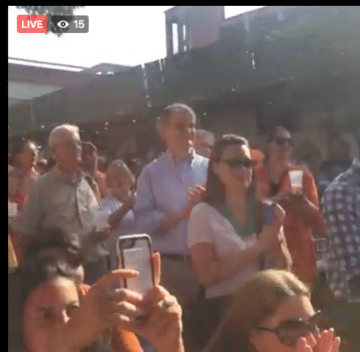
Follow the Observer live on Facebook to hear reproductive rights advocates, Texas lawmakers and orange shirt enthusiasts at Scholz. Alexa’s manning the camera, Andrea takes no responsibility for content.
6:00 p.m.
We are live at Scholz Garten! Here’s Alexa interviewing Whole Woman’s Health’s Marva Sadler, who y’all may know from the Trapped documentary.
4:40 p.m.
Here’s a dispatch from Alexa, who was at the ChoiceWorks press conference earlier today:
The Supreme Court’s decision to strike provisions of HB 2 has been proclaimed as a major victory by reproductive rights organizations who say that facts and science have won the day.
Still, the abortion landscape in Texas won’t change overnight, reproductive rights advocates said today in what was once the patient recovery at Whole Woman’s Health in Austin (one of the many clinics that shuttered since 2013 when HB 2 first took effect). Today’s ruling means that the 19 abortion facilities currently open in Texas can stay open, they reminded reporters. But the fate of the 22 that have closed over the last three years remains to be seen.
“Some of the closed clinics are likely not coming back,” said Rebecca Robertson, a staff attorney with the ACLU of Texas. “Sometimes it takes years to restore access after these laws have passed.”
Dr. Bhavik Kumar, an abortion doctor who travels between San Antonio and Fort Worth to provide services (the Observer interviewed him last year), said that he knows of no clinic, including any Whole Woman’s Health locations, that has immediate plans to reopen. Facilities had to terminate their leases, lay off staff and let their state licenses expire when they were forced to close because they couldn’t comply with HB 2’s restrictions, he said.
As a result of those closures, said Kumar:
“Right now it’s hard to tell exactly what will happen with the landscape of abortion care in Texas but this decision opens the door for things to get better, so we’re hoping it will. We don’t have a timeline on it, but we’re moving forward.”
Beyond the challenges with reopening clinics, funding for abortion remains a barrier for poor Texans struggling to afford the cost of the procedure. Since 1976, the federal Hyde Amendment has banned Medicaid and other public insurance programs from covering abortion services.
Amanda Williams, executive director of the Lilith Fund, a nonprofit that provides financial assistance to Texans who can’t afford their procedures, called HB 2’s three years’ worth of damage “irreversible” and a “dire health care gap” still exists for poor women.
“We could have abortion clinics on every single block, but low income women will continue to see that damage until we’re having, as a community, a real conversation about abortion coverage,” Williams said. “Abortion clinics can reopen all they want, but we have got to take measures to ensure that people are getting the funding they need to actually be able to access the procedure that is their right.”
4:35 p.m.
Emily Horne with Texas Right to Life says the organization is eying a D&E ban for this upcoming legislative session. The dilation and evacuation procedure is commonly referred to by anti-abortion groups and lawmakers as “partial birth abortion,” though that’s not the term doctors and mainstream medical organizations use. Watch Horne’s full debrief here for a glimpse at what’s coming in 2017.
3:30 p.m.
The Observer team will decamp to Scholz Garten in downtown Austin, where reproductive rights advocates are hosting a victory party at 5:30 p.m. We’ll be Facebook-Living (Live-ing?) from there with interviews from activists, legal experts and more!
3:02 p.m.
Who would have thought that it would be a very bad tweet from The Daily Show that would be bringing both anti- and pro-choice people on our Twitter timelines together in squicky outrage?
Celebrate the #SCOTUS ruling! Go knock someone up in Texas!
— The Daily Show (@TheDailyShow) June 27, 2016
2:28 p.m.
More from the dueling pressers! Dan Patrick in Houston, repro rights orgs in Austin.
At ChoiceWorks, the North Austin repro justice organizing space:
Kathy Miller from @TFN: “Facts just don’t seem to matter when they don’t align to the ideology of the Texas Legislature” #txlege #hb2
— Eva Ruth Moravec (@EvaRuth) June 27, 2016
.@DonnaHowardTX "We are going to work to make sure that anything comes before us will be defeated by courts, if not by us in the #TXlege"
— ProgressTexas (@ProgressTX) June 27, 2016
"Sometimes it takes years to restore access after these laws have passed." @ACLUTx #MyDecision #FightBackTX pic.twitter.com/4dNVzTXpg9
— Whole Woman's Health (@WholeWomans) June 27, 2016
And at Dan Patrick’s presser:
.@DanPatrick: "We've seen women die in abortion." According to DSHS data only one woman died from abortion complications since 2008. #txlege
— Teddy Wilson (@txindyjourno) June 27, 2016
One step away from calling her "abortion barbie"… https://t.co/YYqfPCsm4X
— Forrest Wilder (@Forrest4Trees) June 27, 2016
2:21 p.m.
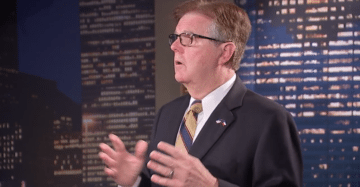
“This ruling is just shocking,” says Lieutenant Governor Dan Patrick, who rails against Planned Parenthood (not a plaintiff in Whole Woman’s v. Hellerstedt) in his live presser this afternoon. Says Hillary Clinton must be stopped. (And something something women’s health.)
Patrick seems fuzzy on the details of what the Hellerstedt case was actually about:
.@DanPatrick: #SCOTUS "upheld 20-week ban" in #HB2. Whole Woman’s Health v. Hellerstedt did not challenge the 20 week ban. #txlege
— Teddy Wilson (@txindyjourno) June 27, 2016
And more:
Patrick: Innocent babies born in the image of God are alive today because of the bills that we passed. #txlege #hb2
— Brittney Martin (@BeeDotMartin) June 27, 2016
.@DanPatrick addressing a packed news conference in Houston discussing today's HB2 ruling by #SCOTUS. #txlege pic.twitter.com/e5nJGI5TJe
— Office of the Lt Gov (@LtGovTX) June 27, 2016
1:48 p.m.
In the Trib, North Texas state Representative Jonathan Stickland, famous for formerly being a fetus and for his terrifying beliefs about marital rape, promises new anti-abortion legislation in 2017:
“I would expect an absolute onslaught of pro-life legislation in the next session,” said state Rep. Jonathan Stickland, R-Bedford. “I’ve never been this upset before, I mean just like truly upset,” he said of the Supreme Court’s ruling.
1:40 p.m.
They popped champagne this morning at the Whole Woman’s Health clinic in McAllen, the last remaining abortion provider in the Rio Grande Valley.
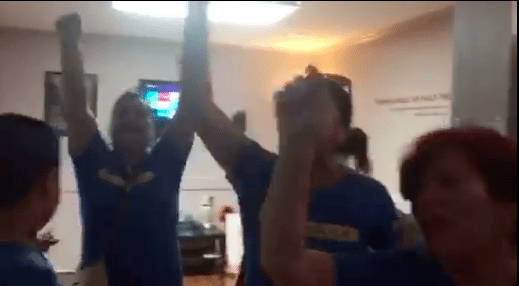
1:04 p.m.
Alexa listened in on a press call with abortion providers and repro rights attorneys earlier today. Here’s her dispatch:
Texas abortion providers, their attorneys and reproductive rights leaders cheered today’s U.S. Supreme Court ruling striking down HB 2’s admitting privileges and ambulatory surgical center requirements. The 5-3 decision, authored by Justice Stephen Breyer, affirms that states must provide concrete evidence that such abortion restrictions actually improve the health and safety of patients. In this case, Breyer wrote, Texas failed to do so.
“These politically motivated, medically unnecessary restrictions have only the purpose of shutting down clinics, and that’s exactly what [HB 2] did in Texas,” Nancy Northup, director of the Center for Reproductive Rights (CRR), told reporters today on a press call following the decision. “The Supreme Court has sent a loud and clear message that politicians cannot use deceptive means to shut down abortion clinics.”
Since HB 2 first took effect in 2013, more than half of Texas’ abortion facilities have shuttered, leaving swaths of the state without a single clinic. Amy Hagstrom Miller, CEO of independent abortion provider Whole Woman’s Health and lead plaintiff in the case, praised the Supreme Court’s ruling, but cautioned that Texas clinics can’t reopen overnight. Hagstrom Miller said since closing, Texas abortion clinics have sold their facilities and laid off staff.
“We have the go-ahead to open clinics, but the process to actually undertake that it is going to take some time,” she said. Still, Hagstrom Miller — who has played a key role in fighting House Bill 2 since it was introduced in 2013 — said she is “elated” by today’s news.
“I want everyone to understand that you don’t mess with Texas, you don’t mess with Whole Woman’s Health, and you don’t mess with this beautiful movement of people dedicated to reproductive rights, health and justice,” she said.
The Supreme Court’s ruling means that HB 2-like restrictions being challenged in other states, such as Oklahoma, Wisconsin and Mississippi, will also be struck down by the courts.
Leading up to today’s decision, reproductive rights advocates and providers were hoping for clarity on the ill-defined “undue burden” standard created by the Supreme Court in the 1992 case Planned Parenthood v. Casey. Today, they got what they were hoping for.
“States can’t just make up bogus reasons for enacting these restrictions that deprive women of access to reproductive health care,” said Stephanie Toti, lead attorney with CRR and counsel who represented Whole Woman’s Health in court. “The Court concluded that the challenged laws provide no health benefit to women whatsoever.”
HB 2 has had a disproportionate impact on the millions of Texans of color and poor and undocumented Texans. Marcela Howell, executive director of In Our Own Voice, called today’s decision “wonderful,” and went on to say that the fight to preserve access to abortion care and reproductive health services for all is far from over.
“We have a long way to go to ensure that all women — regardless of where they live, what their income may be — have access to reproductive health care,” she said.
Stay tuned for more reactions from Texas reproductive rights groups, lawmakers and abortion providers later today.
12:43 p.m.
The Amerian Life League, the righter-rightest-right of the anti-abortion right, is urging “personhood” legislation post-SCOTUS.
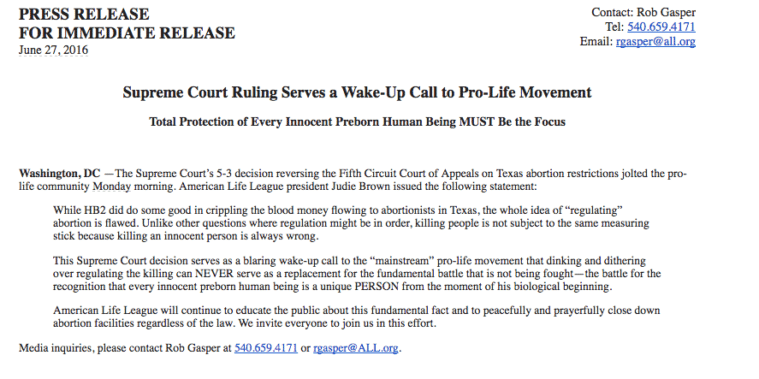
12:09 p.m.
Here’s Texas Right to Life political director John Seago’s statement:
Having exploited all avenues in Texas to dismantle the constitutional and solidly-constructed Pro-Life Omnibus Bill of the 2013 Legislative Session, House Bill 2, abortion zealots ultimately appealed to the Supreme Court. The sensible women’s health legislation of HB 2 was crafted to provide a crucial layer of defense against the predatory and profit-driven antics of Big Abortion. The Court failed women and preborn children this morning. Indeed, the only party which will benefit from today’s majority decision is the abortion industry, which exploits every means available to leech profit from abortion clients. Texas played a key role in the catastrophic Supreme Court ruling which first legalized abortion in 1973, and our work in Texas is far from finished. We look with hope and determination toward our Priority Legislation for the 85th Session of the Texas Legislature, where we plan to continue the trend of blazing the state-by-state path toward the ultimate triumph of Life of our nation.
You can read the rest here.
11:38 a.m.
Anti-abortion Texas lawmakers are not happy this morning:
HB2 ruling reinforces the importance of electing a POTUS who will stop sacrificing women & children to the false idol of abortion. #txlege
— Donna Campbell (@DonnaCampbellTX) June 27, 2016
As a co-writer of #HB2, I am disappointed by the decision, but will remain committed to protecting women's health and safety. #txlege
— Dan Patrick (@DanPatrick) June 27, 2016
Glenn Hager's own statement here–"to protect the unborn"–contradicts the case Texas made to the court ¯_(ツ)_/¯ pic.twitter.com/5rumxmQwuI
— chris hooks (@cd_hooks) June 27, 2016
11:26 a.m.
A lesson in not scheduling tweets, courtesy of Texas Right to Life’s political director, John Seago.
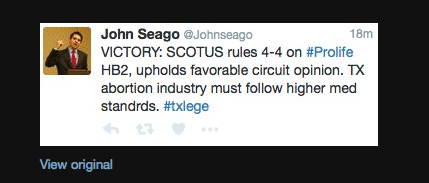
11:16 a.m.
And from the White House:
JUST IN: Pres. Obama is "pleased" the Supreme Court struck down Texas restrictions on abortion clinics. pic.twitter.com/niqZ6ygjG4
— ABC News Politics (@ABCPolitics) June 27, 2016
10:54 a.m.
More from folks reading the decision:
Compassion from #SCOTUS #txlege #HB2 pic.twitter.com/RnNyRM8UfF
— Mary Tuma (@TumaTime) June 27, 2016
Breyer points out that Texas's and the dissent's position would actually endanger women's health. #StoptheSham pic.twitter.com/qUiSwSbbgV
— Imani Gandy (@AngryBlackLady) June 27, 2016
Breyer: How are women supposed to get safe abortion care when they're crammed into clinics? DUH. #StoptheSham
— Imani Gandy (@AngryBlackLady) June 27, 2016
10:52 a.m.
We have not received official statements from Texas Alliance for Life or Texas Right to Life, both of which supported House Bill 2. John Seago, political director for Texas Right to Life, sent this after the ruling came down:
This dangerous SCOTUS ruling allows the abortion indstry 2 challenge any safety laws by threatening 2 close rather than follow law. #txlege
— John Seago (@Johnseago) June 27, 2016
10:50 a.m.
Robin Marty, a freelance reporter who covers reproductive rights, is on a call with HB 2 sponsor state Representative Jodie Laubenberg and other anti-abortion groups in Texas. Here are a few of her live-tweets:
Wright: We are not defeated, we will be back to fight so women can enjoy the same medical standards that other patients enjoy.
— Robin Marty (@robinmarty) June 27, 2016
Lautenberg: our side was so articulate, so factual, not emotional about it. The WWH lawyer was so emotional, so ill prepared.
— Robin Marty (@robinmarty) June 27, 2016
Carol Everett: As a former abortion provider, I knew clinics preyed on patients, brought in 50 patients when they only had 25 sterile equip
— Robin Marty (@robinmarty) June 27, 2016
10:47 a.m.
And, uh, the Texas Health and Human Services Commission, which is tasked with the enforcement of abortion regulations, has sent out a statement about … veterans.
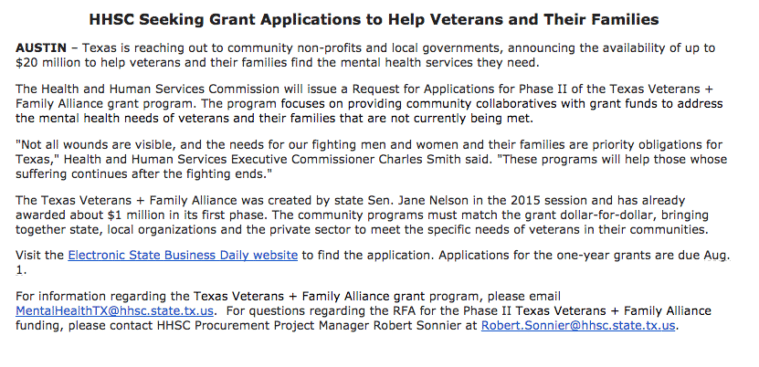
10:45 a.m.
Texas state Senator Charles Perry, the guy behind Texas’ increased judicial bypass restrictions on minors’ abortion access, just released a statement:
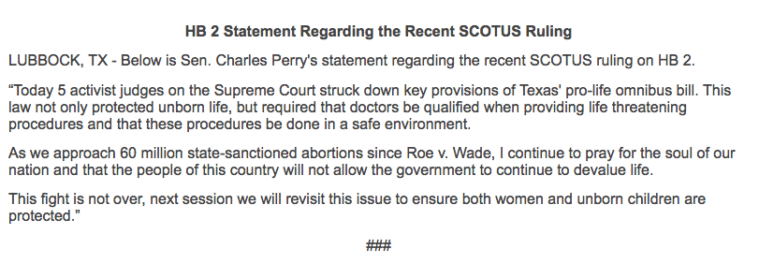
10:35 a.m.
More reax:
It's been three years y'all. Three long years. I'm so happy for my home, the Rio Grande Valley #SCOTUS #StopTheSham
— Nancy Cárdenas Peña (@ncardenastx) June 27, 2016
What do we say to Republicans who try to keep women from accessing safe and legal abortions? #StopTheSham pic.twitter.com/KMdXD2UiiB
— The Democrats (@TheDemocrats) June 27, 2016
Trust abortion providers who know how to provide safe care, just as we trust other physicians. #StopTheSham
— Jane Doe, MD (@DrJaneChi) June 27, 2016
10:28 a.m.
For years, nonprofit organizations in Texas — from the Lilith Fund to Frontera Fund to Fund Texas Choice — have been helping patients fund their procedure, book travel to out-of-town clinics, and get to their appointments safely. Here is their collective response to today’s ruling:
“We commend the Supreme Court’s ruling reaffirming the constitutional rights of all people seeking abortion in this state. This is just the first step in dismantling hundreds of medically unnecessary laws aimed creating barriers to abortion access. While there is still work left to do to ensure all people have access to safe abortion care, we know that when clinic doors are able to remain open across the state, our clients have a better chance of getting the care they need. We remain committed to this work so that all people have bodily autonomy, and the resources and community support to build their families with dignity and respect.”
10:24 a.m.
Since HB 2’s inception, the American College of Obstetricians and Gynecologists has come out hard against the law, insisting that the law’s requirements are medically unnecessary. The group’s reaction to today’s ruling:

10:22 a.m.
Reaction from Wendy Davis, who three years ago stood for 13 hours fighting the legislation that would eventually become HB 2:
Today made that day 3 yrs ago all worth it! So grateful 2 all the women who shared their stories. #WholeWomensHealth pic.twitter.com/vwHx8C7ZCg
— Wendy Davis (@wendydavis) June 27, 2016
10:19 a.m.
From Alexa: I love this line. When Justice Breyer posed this question during oral arguments, it was clear that Texas Solicitor General Scott Keller was floundering in his defense of the law:
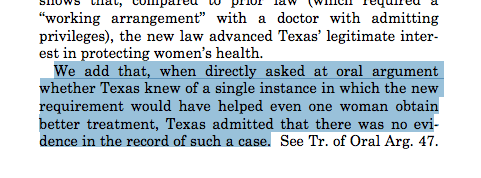
10:15 a.m.
More statements:
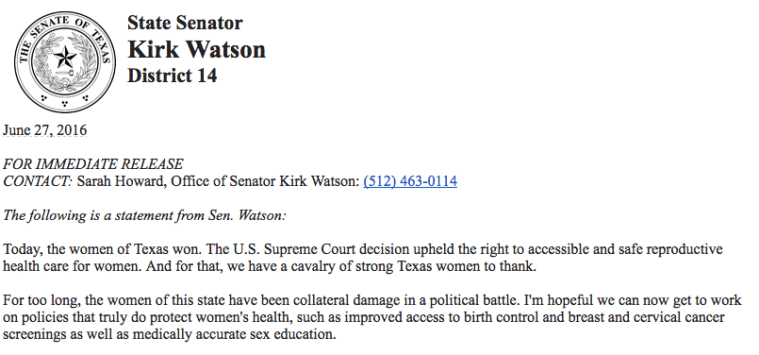
My statement on today's #HB2 SCOTUS decision. #txlege pic.twitter.com/J0XScokL39
— Donna Howard (@DonnaHowardTX) June 27, 2016
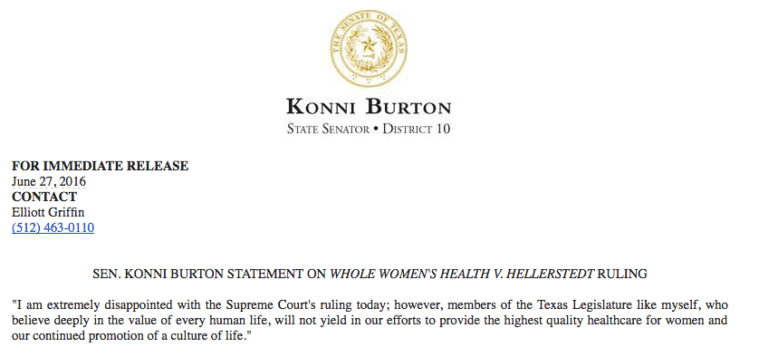
10:09 a.m.
If you’re in Austin (or can get here by tonight) there’s a party at the historic Scholz Garten tonight celebrating the SCOTUS opinion striking down HB 2.
10:05 a.m.
Here’s some nugs from folks reading the opinions:
Justice Kennedy’s votes to preserve aff action and strike down abortion restrictions, plus major rulings last term, are a marked move left.
— SCOTUSblog (@SCOTUSblog) June 27, 2016
there are "experts" who have been straight up lying about abortion complication rates. Breyer is having none of it. pic.twitter.com/AGdl443w0Y
— Imani Gandy (@AngryBlackLady) June 27, 2016
Looks like RBG wrote separately to underscore the risk of unsafe self-induced abortion pic.twitter.com/3BpasE2lTU
— Irin Carmon (@irin) June 27, 2016
So refreshing for Texans: Basic COMMON SENSE factoring into the #HB2 #SCOTUS ruling #txlege pic.twitter.com/nQ2SjTepwO
— Mary Tuma (@TumaTime) June 27, 2016
THIS DECISION IS AMAZEBALLS. Get us a 5th justice and we can finally put Gonzales to bed
— Jessica Pieklo (@Hegemommy) June 27, 2016
Anti-choicers are going to be keening about Gosnell all day. Pshaw. It's bullshit and they know it. #StopTheSham pic.twitter.com/cQkEi2qLDT
— Imani Gandy (@AngryBlackLady) June 27, 2016
9:55 a.m.
Here’s Ruth Bader Ginsburg, concurring:
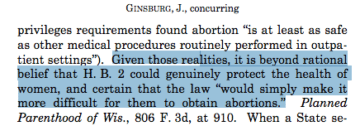
9:53 a.m.
The memes have begun.
WHO DID THIS pic.twitter.com/J8GaON49rE
— Jessica Luther (@scATX) June 27, 2016
9:51 a.m.
This is a screenshot from SCOTUSBlog. Can confirm that there is maximum Beyoncé currently playing in the Observer‘s Texas tiki shed HQ.

Also, in Washington:
Breaking out the #Beyonce outside #scotus pic.twitter.com/bgE35aNzhd
— Katie Leslie (@katieleslienews) June 27, 2016
9:49 a.m.
And Hillary Clinton’s:
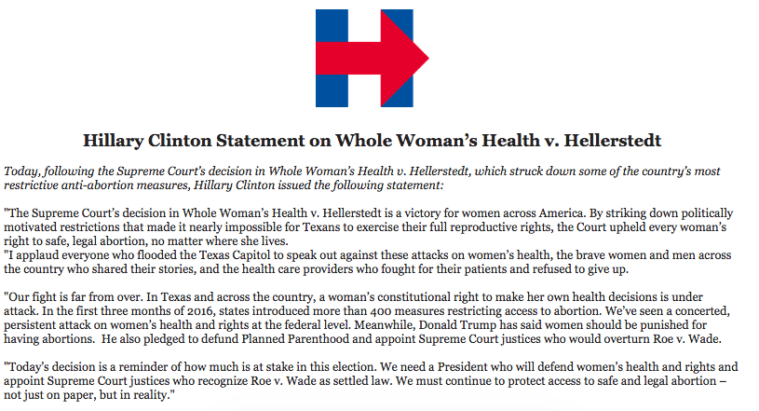
9:45 a.m.
Here’s Governor Greg Abbott’s statement:
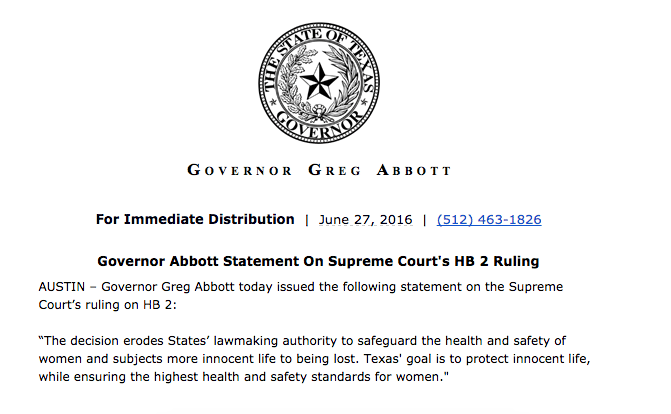
9:33 a.m.
Anti-abortion lawmakers and lawyers for the state of Texas invoked noted criminal Kermit Gosnell (who also performed some legal abortions) as justification for the restrictions in HB 2. SCOTUS didn’t go for it.
SCOTUS: Gosnell is not a magical conjuring word that justifies every new abortion restriction pic.twitter.com/xqNRl3aEwa
— Forrest Wilder (@Forrest4Trees) June 27, 2016
9:30 a.m.
Texas Lieutenant Governor Dan Patrick calls the SCOTUS ruling a “devastating blow” to patient safety. Here’s his full statement:
“HB 2 was passed during the 83rd Texas legislative session to ensure the health and safety of women by holding abortion clinics to the same standards as ambulatory surgical centers while also requiring practitioners to have admitting privileges at a hospital within 30 miles of the facility.
Now abortion clinics are free to ignore these basic safety standards and continue practicing under substandard conditions. By its ruling, the Court held that the ability of abortion clinics to remain open – even under substandard conditions –outweighs the state’s ability to put women’s health and safety first.
Despite today’s devastating impact on women’s health care, and as the proud author of the sonogram bill and co-writer of HB 2, I remain committed to protecting women’s health and safety.”
9:23 a.m.
Here’s Alexa parsing Breyer’s opinion:
Breyer writes that Texas failed to show how HB 2’s admitting privileges requirement protects patients: “The State’s record evidence, in contrast, does not show how the new law advanced the State’s legitimate interest in protecting women’s health when compared to the prior law, which required providers to have a “working arrangement” with doctors who had admitting privileges.” He also rules that the requirement places a “substantial obstacle” before women seeking abortion care.
Breyer includes fewer clinics, longer wait times as examples of “undue burden,” but calls increased driving distances an “additional burden,” not “undue.” Taken together, though, he agrees with the district court’s ruling that this law creates an undue burden.
On the ambulatory surgical center requirement, Breyer writes that the ASC standards are “generally unnecessary in the abortion clinic context.”
9:20 a.m.
Heather Busby, executive director of NARAL Pro-Choice Texas:
“Today’s Supreme Court ruling is a victory for Texans’ health and safety. This decision means that the remaining abortion clinics in Texas won’t have to close their doors and paves the way for other clinics to open to meet the needs of underserved communities across the state.
Nancy Northup, President and CEO of the Center for Reproductive Rights:
“Today women across the nation have had their constitutional rights vindicated. The Supreme Court sent a loud and clear message that politicians cannot use deceptive means to shut down abortion clinics.”
Amy Hagstrom-Miller president and CEO of Whole Woman’s Health and lead plaintiff in the case:
“Today, the Supreme Court affirmed what we at Whole Woman’s Health have known all along—that every woman, no matter where she lives, deserves access to compassionate, respectful, and comprehensive care from a clinic she trusts. Today justice was served.”
Nan Kirkpatrick, Texas Equal Access Fund director:
“We hope clinics in the Panhandle and other underserved regions of Texas are able to reopen in response to this decision. However, while we are happy with this particular ruling, the fight for abortion access in Texas is far from over. TEA Fund fights for the removal of a federal ban on abortion coverage for low-income people and countless state laws that make accessing an abortion more difficult. We will not rest until all people can access abortion, regardless of economic circumstance.”
9:16 a.m.
Statements from orgs and lawmakers are coming in, and we’ll post them in a second. In the meantime, here’s the opinions: clickity.
Here’s what it looked like at the Center for Reproductive Rights, the nonprofit legal group that represented Texas abortion providers in the case:
Reactions from @ReproRights NY upon hearing the Supreme Court decision in @WholeWomans! #MyDecision #StopTheSham pic.twitter.com/uHK1I1XyZN
— CenterforReproRights (@ReproRights) June 27, 2016
AFTER A VERY LARGE FREAKOUT, 9:11 a.m.
Writes Alexa:
With a 5-3 vote, the U.S. Supreme Court has reversed the Fifth Circuit’s ruling that upholds two major provisions of Texas’ anti-abortion law House Bill 2.
From SCOTUS Blog:
“Second holding: Both the admitting privileges and surgical center requirements place a substantial obstacle in the path of women seeking a previability abortion, constitute an undue burden on abortion access, and thus violate the Constitution.”
Justice Stephen Breyer has written the majority opinion, Ruth Bader Ginsburg with the concurring and Clarence Thomas with the dissent.
9:05 a.m.
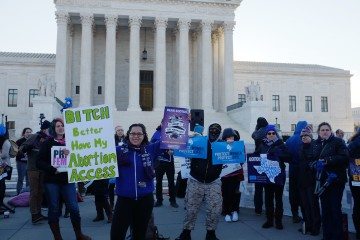
From Alexa:
Today’s decision should (hopefully) clarify for us how far states can go in passing abortion regulations and how the courts balance patient safety with undue burden. Remember, major medical groups have said HB 2’s restrictions aren’t medically necessary, and in fact, the law has made abortion more expensive and harder to access.
9:02 a.m.
The first opinion is in (we’ll get three today) and it’s Voisine v. United States, which is not the Texas abortion case, obviously.
8:55 a.m.
This is the scene at ChoiceWorks, the facility that used to be Whole Woman’s Austin before HB 2, and now serves as a co-working space for reproductive justice organizations:
8:50 a.m.
The scene in Washington:
Hundreds are rallying outside #SCOTUS this morning ahead of today's #HB2 #abortion ruling pic.twitter.com/N0tD5ZAJr8
— Sarah Brooks Grady (@Sarah_K_Brooks) June 27, 2016
8:48 a.m.
For a fantastic lawerly rundown of what might happen today, Rewire‘s legal reporting superstars Imani Gandi and Jessica Pieklo ‘splain what might happen if we get a plurality opinion on the case today as in, not a majority, but not a split, with the possibility of an entire new issue being introduced into the case.
Andrea thinks we’ll have a 4-4 split, because she wants a resolution to this case so desperately and she never gets what she wants. Alexa’s “gut” says plurality, because of a question Justice Kennedy asked during oral arguments earlier this year, concerning whether an increase in surgical abortions (because HB 2 limits medication abortions) is medically wise.
8: 42 a.m.
Alexa and Andrea are live from the Texas tiki shed (if you’re a Texas Miracle listener, you know what that is, and if you’re not: it’s Andrea’s backyard tiki bar) watching the SCOTUSBlog for news from the Supreme Court, which is expected to rule this morning in Whole Woman’s v. Hellerstedt, the case against Texas’ omnibus anti-abortion law, HB 2.
